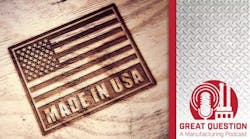Faculty members at UNC Charlotte recently partnered with local high-school students and manufacturers to produce recyclable protective shields designed to extend the life of the disposable face masks used by health care workers combating the COVID-19 pandemic.
What started as a homegrown effort using a host of 3D printers producing about 250 shields per week quickly escalated. Since March 30, the group, known as Charlotte MEDI, has been working with manufacturers like Texlon Plastic Corp. and Caro-Poly to create shields via injection-molding with an aggressive production timeline. The injection-molder can make four shields per minute (up to 10,000 per day), versus four every eight hours via 3D printer. The group is producing an average of 10,000-12,000 face shields per day, with a goal to mass manufacture 100,000 face shields by the end of April. The recyclable shield effectively extends the life cycle of a mask that otherwise is a one-time-use item.
Currently the group has delivered more than 75,000 shields from injection molding and 2,500 shields from 3D printing for local and national frontline health care professionals and are sharing what they’ve learned with researchers across the country as they prepare for patient numbers in their states to climb. UNC Charlotte faculty members continue to explore technology options to accelerate production, and so far have shared their work with states including, California, New Jersey, Michigan, New York and Washington D.C., and countries including Germany, India and Ireland.
“It has been such a privilege to partner with the Charlotte MEDI team on this project,” said Keri Malament Cowles, a med student at UNC Chapel Hill who is working with Charlotte MEDI group. “As a medical student, it has been difficult to be on the sidelines as friends and colleagues put their lives at risk every day on the front lines, but witnessing the Charlotte community and others come together in such a meaningful way during this pandemic has been so inspiring to me. It is so easy to feel overwhelmed by the magnitude and gravity of the crisis at hand, but I have learned that no matter your situation, skillset, or background, you can make a difference by taking on one small piece of the larger effort.“
We wanted to learn more, so we connected with some of the central participants to discuss the coalition’s plans for the remainder of the COVID-19 outbreak.
Smart Industry: What was the motivation for this project?
Terence Fagan, associate teaching professor of mechanical engineering: Simply put, to help. We are neighbors, friends, husbands, wives, fathers, mothers, sons and daughters of people working to keep us safe in hospitals and clinics around the globe. Charlotte MEDI has expertise that lends itself to the needs of healthcare workers throughout the Charlotte region and across the country. There was never a doubt that we could make an impact and work to fill the gap left by the PPE (personal protective equipment) shortage.
Alex Cabral, UNCC’s director of fabrication labs for the School of Architecture in the College of Arts + Architecture: And on a more personal level, I teach so that my students understand their ideas as something that can exist in the real world. This is an opportunity to live by those lessons while making a difference for tens of thousands of front-line first responders.
Smart Industry: How are you employing 3D printers?
Alex: We are using 3D printers to keep our group creative and nimble through the processes of design and fabrication. They provide us with the ability to rapidly prototype ever-evolving ideas, accelerating our path to quality feedback from health care workers. The goal is to use 3D-printing technologies as a means to enter mass manufacturing with confidence in our products.
Terence: We are using FDM/FFF printers to create components of our face shield as well as to test designs of masks and respirators. Additionally, we are using SLA printers to create finished components out of a surgical resin.
Atrium Health workers in Charlotte express thanks for the MEDI masks. [Photo: Charlotte MEDI]
Smart Industry: What are you manufacturing?
Terence: We started with 3D printing because the technology allowed us to be more flexible with our solutions. The move to injection molding was quick, but necessary given how sharply the COVID curve was rising. With 3D printing, we were producing a face shield in about five hours. In our move to injection molding, we can produce two face shields in just under one minute. By collaborating directly with the industry experts, we went from 3D printing to injection molding in 2.5 days; typically a 6-8 week process.
Alex: Across our group, mass manufacturing has seen us increase from 100 parts per day to 10,000 parts per day. At our laser cutting and CNC facilities, we are churning out 10,000-12,000 clear transparent visors per day. In total, we have delivered more than 75,000 completed face shields in three weeks to the Charlotte region and the following states: South Carolina, California, New Jersey, Michigan, Georgia, Massachusetts, Maryland, Arizona, Nevada, Colorado, Louisiana, New York and Washington D.C. Our goal is to hit 100,000 face shields by the end of April. Our largest shipping day was 11,000 face shields delivered.
Smart Industry: What lessons are you sharing with others?
Alex: Our goal has always been to share this process with those in other areas of the country (or globe) who could replicate it. There is no need for others to hit every hurdle we did. Take our files, take our tooling, take our hospital approvals and start making connections in your local community. At each step, work directly with doctors, nurses and hospital administration to ensure that what you do is worthwhile, helpful and safe. Engage directly with the manufacturers and trust their experience. Do not be shy about asking for help and work with people who help to cover the things you are weakest at. Those relationships will create a robust interdisciplinary culture.
Terence: Our communities are filled with brilliant minds and skilled workers who want to help make a difference, so start making phone calls. Talk with your friends, family, colleagues and administrators. Shake every tree. Charlotte MEDI is a group of makers, hackers, designers, engineers, product managers and teachers volunteering to do this work. There is nothing special about us. Go be great. We are here to help.


